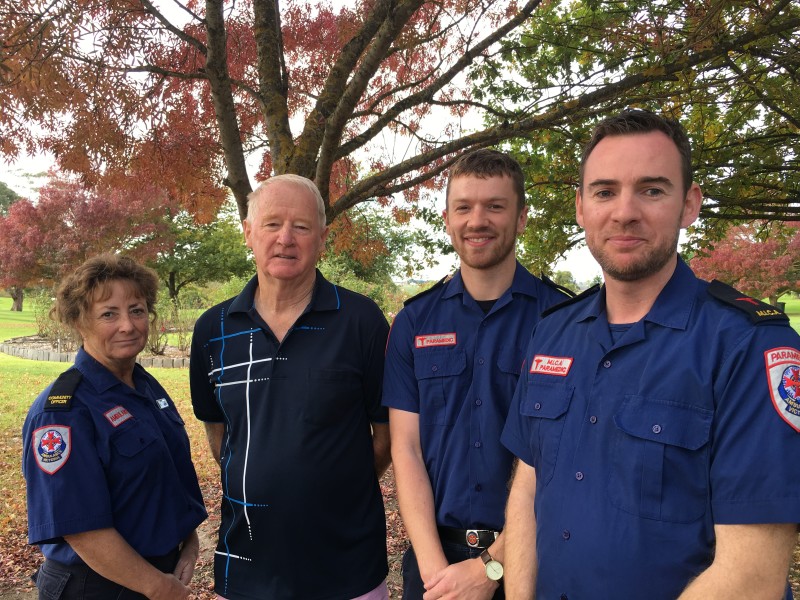Cobden man reunited with paramedics
April 29, 2016in News
A Cobden man who suffered a heart attack has thanked the paramedics who helped save his life.
Peter Harris was reunited with the Mobile Intensive Care Ambulance (MICA) paramedic, Advanced Life Support paramedic and one of the Ambulance Community Officers who came to his aid in February.
Peter, 70, felt pain in his chest and fell to the ground while doing manual labour at home in south western Victoria. His wife drove him to the local doctor who called Triple Zero.
Advanced Life Support paramedic Patrick McNamara and two Ambulance Community Officers attended the GP clinic and began initial treatment before taking Peter to Terang Hospital where they met MICA paramedic Heath Butler who administered blood-clot busting drugs.
An Air Ambulance helicopter flew Peter from Terang to Geelong Hospital. He is now recovering at home.
He is one of ninety-nine people give blood-clot busting drugs in the two years since a statewide rollout of the advanced treatment for heart attacks started.
MICA paramedics in rural and regional Victoria started carrying the thrombolytic drugs in April 2014 and a total of 242 are trained to administer it.
Peter said he was very appreciative of the efforts of those who helped him.

`They were brilliant. The drugs saved my life. I can tell you that,’ Peter said.
`I went from excruciating pain to nothing. I haven’t had pain since.’
MICA paramedic Heath Butler said Peter was the first patient he had treated with the new drug.
`It’s an excellent example of AV paramedics working with the local health service to achieve a brilliant patient outcome,’ Heath said.
`It was a bit unusual for me to be working in a rural ED but it was great that the paramedics and ACOs came together with the nursing staff to help Peter.
`This is an example of a case where as a paramedic we can make a real difference to people’s lives and, in this case, being able to remove what was probably a life-threatening clot in Peter’s heart has meant he has been able to return to his life as normal.
`It was exciting for my first thrombolysis case to have worked so spectacularly well.’
Ambulance Victoria Acting General Manager Emergency Operations Mick Stephenson said the drugs were used on patients experiencing a heart attack caused by a blocked coronary artery.
`The drug is potentially life-saving. By opening up the artery it can reduce the amount of heart tissue damaged during a heart attack and improve the long term health outcome for these patients,’ Mr Stephenson said.
`We know that MICA paramedics in rural and regional Victoria carrying these drugs is making a real difference to our patients.’
A heart attack occurs when an area of the heart is seriously deprived of blood because of a blocked vessel. The warning signs and symptoms of a heart attack can vary from person to person but often last for at least 10 minutes and may include chest pain and shortness of breath. A heart attack can progress to a cardiac arrest.
Anyone experiencing the symptoms of a heart attack should call Triple Zero (000).
